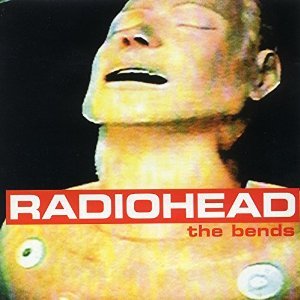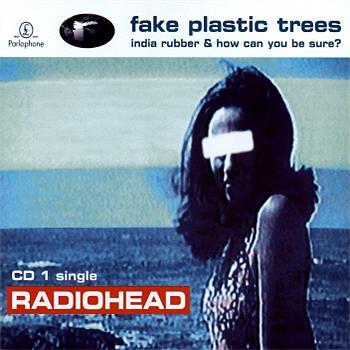“You can force it but it will not come.” Dear god this album’s sweet perfections. It’s the thing that convinced me Radiohead were making music I’d never heard before but would listen to a million times without feeling drudgery. Listen to the drums and the nearly demonic, menacing synth noise that crashes during the first chorus. “Everyone is...broken.” Yes. Yes. Add on the original title Planet Xerox and you feel how this album begins without any sense of positivity. There’s no chance of “Anyone Can Play Guitar”s Romantic view of Rock. This album was spawned by “Blow Out” and the cynicism of “Inside My Head” (as I said in my post on Pablo Honey: track it down, dammnit!)

Yorke’s lyrics take a huge leap in complexity, avoiding rock cliches and reminding we feeble Americans that there’s a fine line between opaque lyricism and outright gibberish (see: 90s grunge and post-grunge nonsense lyrics). Do I wish some of the lyrics made a bit more sense? Not on The Bends. (Ok, maybe “Sulk” could be a bit less obtuse -- it’s about a serial killer, according to Yorke.)
The Bends really captures a sense of paranoia and a shifting earth. Does Yorke trust anyone? Even his bandmates? Well, dig through the countless interviews and figure it out. Regardless of the personal demonology, the album does its best to capture the rush towards the age of over-sharing and under-trusting via the still nascent online world (this is the age of CompuServe and Prodigy and AOL).
The Bends really captures a sense of paranoia and a shifting earth. Does Yorke trust anyone? Even his bandmates? Well, dig through the countless interviews and figure it out. Regardless of the personal demonology, the album does its best to capture the rush towards the age of over-sharing and under-trusting via the still nascent online world (this is the age of CompuServe and Prodigy and AOL).
“We don’t have any real friends!” Yorke declares on the title track, the band’s first draft of a “Paranoid Android” kind of epic. Hear the imagery, absorb the shifts in rhythm and energy. “I wanna live, / breathe, / I wanna be a part of the human race!” Have you ever played the riff that follows that line? It’s neat, like the perfect leap of a little spider. The whole song crashes down.
But the idea of leaping reappears in the silly little pop song “High and Dry.” Here’s song that often leaves the daredevil suspended, despite the threats of injury that Yorke’s obsessed with in this period (see: “Bones” & “High and Dry” b-sides: “Killer Cars” & “Stupid Car.” Nevermind the imagery of “My Iron Lung”). The simple solo, the verse-chorus-verse setup. It’s not surprising Yorke seemed to despise this song, often introducing it as meaningless and “just a pop song.” In fact, they only played it a total of 81 times between 1994-7. (Perspective: they played “Creep” 129 times and the single “Just” 142 times in that same timeframe. Info from www.58hours.com).
But the idea of leaping reappears in the silly little pop song “High and Dry.” Here’s song that often leaves the daredevil suspended, despite the threats of injury that Yorke’s obsessed with in this period (see: “Bones” & “High and Dry” b-sides: “Killer Cars” & “Stupid Car.” Nevermind the imagery of “My Iron Lung”). The simple solo, the verse-chorus-verse setup. It’s not surprising Yorke seemed to despise this song, often introducing it as meaningless and “just a pop song.” In fact, they only played it a total of 81 times between 1994-7. (Perspective: they played “Creep” 129 times and the single “Just” 142 times in that same timeframe. Info from www.58hours.com).

Anyway, who cares about “High and Dry,” right? This album is all about two tracks: “Fake Plastic Trees” and “Street Spirit [Fade Out].” Right? Well, yes if you’re not old enough to know Radiohead as something other than the publicity shy, MTV-avoiding, press-hating band that they’d become post OK Computer. But this album offers such amazing moments, from “Bones” spiking vocals and gritty guitar along with “I used to fly like Peter Pan! / All the children flew when they touched my hands!”
But still, there’s more and more here. Yes, I extolled the virtues of Pablo Honey, but The Bends is near perfection in terms of pacing both on a song-level and in tracklisting. “Nice Dream” feels like floating on the ocean, watery, soft feeling after the crunch of “Bones.” “Nice Dream” then leads into the upfront guitar mastery of “Just,” one of the band’s most complicated early songs (There’s a thousand chords crammed in there.)
But still, there’s more and more here. Yes, I extolled the virtues of Pablo Honey, but The Bends is near perfection in terms of pacing both on a song-level and in tracklisting. “Nice Dream” feels like floating on the ocean, watery, soft feeling after the crunch of “Bones.” “Nice Dream” then leads into the upfront guitar mastery of “Just,” one of the band’s most complicated early songs (There’s a thousand chords crammed in there.)
Then, “My Iron Lung,” one of the best songs to hear live. Drink in that metallic, twisty riff that sounds like robot cancer—yes, robot cancer.“The brain / says I’m re-ceiv-ing pain, / a lack of ox-y-gen, / from our li-fe support.” What fresh hell did Yorke experience in his life to obsess about pain and death so much? Oh, just a bunch of hospital visits for his eye when he was a little kid. Just a summer of working at a mental hospital (which would inspire “Climbing Up the Walls.”) Couple of car accidents. I mean, what else do you want from the guy, sunshine? Drinking songs? Leave that shit to Oasis. Radiohead makes the stuff that sounds like art compressed into neat packages. “When the power runs out / we’ll just hum.” Hum what? Pop songs.
But oh, before I hear the wrath of thousands arguing that Radiohead isn’t a pop song writing band, that the albums supersede the beauty of the tracks, before that happens we hear: the soft throb of “Bullet Proof.” What a chilling song featuring Johnny Greenwood’s nearly liquid arpeggios and Yorke’s gentle, haunting prolonged “proooooooof.” And oh the guitar work and the sound of a solemn wind behind it all—it’s perfection. Like a song captured in sap, eventually becoming fossilized. Track down some live versions to hear Johnny Greenwood get all sound-nerdy. (1995 Paris Cafe de la Danse, for one; 1995 Stockholm FM recording for a better sounding one).
We need to fade out, again, though. The pressures and paranoia of the album all get soothed by the tap-tap-tap of the drums and the driving arpeggio of “Street Spirit.” Simple backing keyboards, Yorke’s best vocal performance out of the first two albums, and lyric imagery that still outshines some of their later work. “[tap tap tap] Cracked eggs, / dead birds, / scream as they fight for life; I can feel death, can see its beady eyes.” I always felt like the video for “Just” should’ve been used for this song as it seems like there’s something secret here that is just past knowable. Then again, the original is fantastic too.


